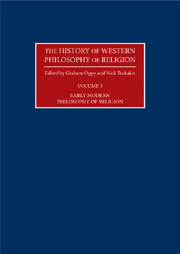Book contents
- Frontmatter
- Contents
- Editorial Introduction
- Contributors
- 1 Early Modern Philosophy of Religion: An Introduction
- 2 Niccolò Machiavelli
- 3 Martin Luther
- 4 John Calvin
- 5 Michel de Montaigne
- 6 Francisco Suárez
- 7 Thomas Hobbes
- 8 René Descartes
- 9 Ralph Cudworth
- 10 Blaise Pascal
- 11 Baruch Spinoza
- 12 John Locke
- 13 Gottfried Wilhelm Leibniz
- 14 George Berkeley
- 15 Voltaire
- 16 The Deists
- 17 Jonathan Edwards
- 18 Thomas Reid
- 19 David Hume
- 20 Denis Diderot
- 21 Immanuel Kant
- 22 Gotthold Ephraim Lessing
- 23 William Paley
- Chronology
- Bibliography
- Index
14 - George Berkeley
- Frontmatter
- Contents
- Editorial Introduction
- Contributors
- 1 Early Modern Philosophy of Religion: An Introduction
- 2 Niccolò Machiavelli
- 3 Martin Luther
- 4 John Calvin
- 5 Michel de Montaigne
- 6 Francisco Suárez
- 7 Thomas Hobbes
- 8 René Descartes
- 9 Ralph Cudworth
- 10 Blaise Pascal
- 11 Baruch Spinoza
- 12 John Locke
- 13 Gottfried Wilhelm Leibniz
- 14 George Berkeley
- 15 Voltaire
- 16 The Deists
- 17 Jonathan Edwards
- 18 Thomas Reid
- 19 David Hume
- 20 Denis Diderot
- 21 Immanuel Kant
- 22 Gotthold Ephraim Lessing
- 23 William Paley
- Chronology
- Bibliography
- Index
Summary
George Berkeley (1685–1753), Irish philosopher and Anglican cleric, was born in County Kilkenny. He studied at Kilkenny College and Trinity College, Dublin, graduating from Trinity College in 1704. A few years later, in 1707, he received his MA and was elected a fellow. He was ordained a priest in 1710.
Berkeley's first major work, An Essay Towards A New Theory of Vision (hereafter New Theory of Vision), appeared in 1709. The book is a significant contribution to the study of visual perception. Berkeley's views in metaphysics and epistemology are famously advanced in A Treatise Concerning The Principles of Human Knowledge (hereafter Principles; 1710) and Three Dialogues between Hylas and Philonous (hereafter Three Dialogues; 1713). The discourse Passive Obedience (1712) offers a theoretical account of moral and political issues.
Between 1713 and 1720, Berkeley spent time in London and travelled on the Continent. In 1721 he received the degree Doctor of Divinity and published De motu (Of motion), a tract on natural philosophy. He was appointed Dean of Derry in 1724. He married Anne Forster in 1728, and from 1729 to 1731 he lived with his family on Rhode Island. Berkeley wanted to found a college in Bermuda but did not receive the financial support he was promised and thus returned to London. After the years in America he published another influential work, Alciphron, or the Minute Philosopher (hereafter Alciphron; 1732).
- Type
- Chapter
- Information
- The History of Western Philosophy of Religion , pp. 183 - 196Publisher: Acumen PublishingPrint publication year: 2009

